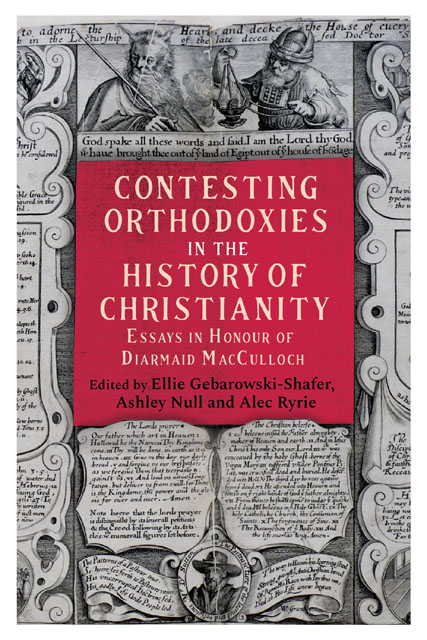Book contents
- Frontmatter
- Contents
- List of Illustrations
- List of Contributors
- List of Abbreviations
- Introduction
- 1 ‘Jewish Christianity’ in Antiquity: Meaningless Category or Heuristic Irritant?
- 2 ‘Sola Fide’: the Wrong Slogan?
- 3 Both Cromwellian and Augustinian: the Influence of Thomas Cromwell on Reform within the Early Modern English Austin Friars
- 4 Lex, Rex and Sex: The Bigamy of Philipp of Hesse and the Lutheran Recourse to Natural Law
- 5 The Authority of Scripture in Reformation Anglicanism: Then and Now
- 6 Orthodoxy and Heresy in the Post-Reformation
- 7 Profanity and Piety in the Church Porch: the Place of Transgression in Early Modern England
- 8 Writing on the Walls: Word and Image in the Post-Reformation English Church
- 9 The Myth of the Church of England
- 10 Mysticism, Orthodoxy and Reformed Identity before the English Revolution: the Case of John Everard
- 11 Sacrilege and the Sacred in England’s Second Reformation, 1640–1660
- 12 ‘I had not the patience to be quiet’: Arthur Bury and The Naked Gospel
- 13 ‘A soul-corrupting indifferentism’: the Intellectual Development of Benjamin Henry Latrobe
- 14 Newman, Dogma and Freedom in the Church
- 15 ‘Tommy, ’ow’s yer soul?’ Reconsidering Religion and the British Soldier
- 16 The King James Vulgate
- 17 The Myth of the Anglican Communion?
- Select bibliography of Diarmaid MacCulloch’s scholarly publications
- Bibliography
- Index
- Tabula Gratulatoria
- Studies in Modern British Religious History
2 - ‘Sola Fide’: the Wrong Slogan?
Published online by Cambridge University Press: 09 January 2024
- Frontmatter
- Contents
- List of Illustrations
- List of Contributors
- List of Abbreviations
- Introduction
- 1 ‘Jewish Christianity’ in Antiquity: Meaningless Category or Heuristic Irritant?
- 2 ‘Sola Fide’: the Wrong Slogan?
- 3 Both Cromwellian and Augustinian: the Influence of Thomas Cromwell on Reform within the Early Modern English Austin Friars
- 4 Lex, Rex and Sex: The Bigamy of Philipp of Hesse and the Lutheran Recourse to Natural Law
- 5 The Authority of Scripture in Reformation Anglicanism: Then and Now
- 6 Orthodoxy and Heresy in the Post-Reformation
- 7 Profanity and Piety in the Church Porch: the Place of Transgression in Early Modern England
- 8 Writing on the Walls: Word and Image in the Post-Reformation English Church
- 9 The Myth of the Church of England
- 10 Mysticism, Orthodoxy and Reformed Identity before the English Revolution: the Case of John Everard
- 11 Sacrilege and the Sacred in England’s Second Reformation, 1640–1660
- 12 ‘I had not the patience to be quiet’: Arthur Bury and The Naked Gospel
- 13 ‘A soul-corrupting indifferentism’: the Intellectual Development of Benjamin Henry Latrobe
- 14 Newman, Dogma and Freedom in the Church
- 15 ‘Tommy, ’ow’s yer soul?’ Reconsidering Religion and the British Soldier
- 16 The King James Vulgate
- 17 The Myth of the Anglican Communion?
- Select bibliography of Diarmaid MacCulloch’s scholarly publications
- Bibliography
- Index
- Tabula Gratulatoria
- Studies in Modern British Religious History
Summary
Keeping orthodoxy stable across the span of centuries is never easy. This essay’s starting point is Krister Stendahl’s insight that ‘sayings which originally mean one thing later on were interpreted to mean something else, something which was felt to be more relevant to human conditions of later times’. Applying this to Luther’s doctrine of justification, it asks whether Luther was rightly understood by later Protestants, and, more fundamentally, did Luther rightly understand Paul? In his letter to the Romans, Paul defied Jewish Christian expectations for who could be a believer, arguing for a reinterpretation of the Law of Moses that included Gentile believers through participation in Christ. Luther, for whom the inclusion of Gentiles was no longer a live question, instead read Romans in light of the pastoral needs of his day, arguing against those who would try to earn salvation through pious works and in the process breaking with established orthodoxies. Later Protestants emphasised Luther’s ‘forensic justification’ by faith as the enduring principle of the Reformation, to the exclusion of Paul’s understanding of participation in Christ, but Luther himself did not make that mistake: his teaching of the ‘happy exchange’ emphasised justification as union with Christ, since Jesus assumed human sin and gave believers his righteousness instead. Despite reading Paul in a very different situation from the apostle’s, Luther created a new, but never stable, orthodoxy which still was fundamentally faithful to the heart of the Pauline gospel.
In the evening I went very unwillingly to a society in Aldersgate Street, where one was reading Luther’s preface to the Epistle to the Romans. About a quarter before nine, while he was describing the change which God works in the heart through faith in Christ, I felt my heart strangely warmed. I felt I did trust in Christ, Christ alone for salvation; and an assurance was given me that He had taken away my sins, even mine, and saved me from the law of sin and death.
The importance of Luther’s teaching on Romans for Wesley’s so-called ‘conversion’ and theology was typical of much of Protestantism for centuries. ‘The change which God works in the heart through faith in Christ’ is nothing less than ‘justification by grace through faith’, which was so important for Luther – and, before him, for Paul himself.
- Type
- Chapter
- Information
- Contesting Orthodoxies in the History of ChristianityEssays in Honour of Diarmaid MacCulloch, pp. 25 - 39Publisher: Boydell & BrewerPrint publication year: 2021



